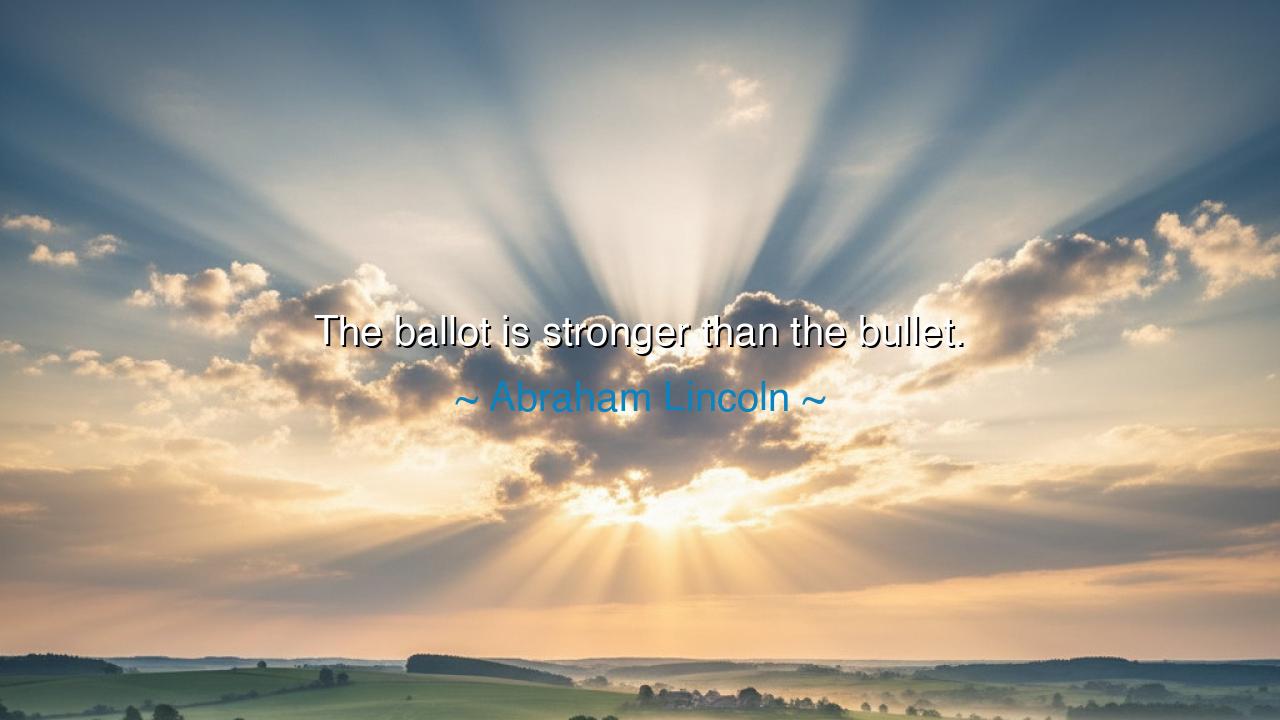
The ballot is stronger than the bullet.






The words of Abraham Lincoln, “The ballot is stronger than the bullet,” shine with the light of faith in democracy. Spoken by a man who himself would be struck down by violence, these words proclaim that true power lies not in the force of arms but in the will of the people. The bullet may silence a life, but the ballot shapes nations, carving laws and destinies not for a moment, but for generations.
In the ancient spirit, this truth resounds like the wisdom of philosophers who weighed justice against tyranny. The sword may win empires, but its victories are fleeting. The ballot, wielded by free citizens, creates a strength that cannot be undone by fear. Lincoln saw that a nation built on votes, not violence, was one that would endure. The bullet destroys, but the ballot builds.
History bears witness in Lincoln’s own time. The United States trembled in civil war, brother against brother, with the bullet tearing the land apart. Yet Lincoln knew that even in war’s shadow, the future would be secured not on the battlefield alone, but in the preservation of democracy—the ability of the people to choose their leaders and their course. It was through the ballot, not endless bullets, that the Union could be preserved and healed.
Consider also the story of India’s independence. Though born of protest, sacrifice, and at times bloodshed, its triumph came when millions cast their voices in votes, building a nation upon the consent of the governed. Gandhi, like Lincoln, believed that nonviolent strength, expressed through unity and civic power, could outlast the might of guns. Here again, the ballot proved stronger than the bullet.
So let this wisdom be passed down: violence may seize power for a day, but only the people’s voice can sustain it for an age. The bullet seeks to impose by fear, but the ballot persuades by justice. Lincoln’s words are a charge to every generation: guard your right to vote, for in it lies the truest weapon of freedom, greater than any rifle, sharper than any sword. It is the power not to destroy, but to create—a power that no tyrant can withstand when the people rise together.






DNDl Nghia
This quote is a testament to the strength of democratic principles. But I wonder—can we truly believe that voting is always the most powerful way to influence change? In countries where elections are rigged or manipulated, or where people’s basic rights are denied, is the ballot still a symbol of strength? What can we do to ensure that the ballot is always stronger than the bullet in every society?
MLMy Le
Lincoln’s quote is a call for faith in democracy, and it’s something I think we all need to remember. However, I wonder how true it is in today's polarized society. When political divides are so deep and trust in the system is eroding, does the ballot still hold the same weight? Or are we at a point where people are starting to lose hope in the system altogether, turning to more extreme measures instead?
TTAnh Trieu Tuan
This quote carries a lot of weight, but it also begs the question: in times of extreme injustice or oppression, can the ballot always be the strongest tool for change? There are historical examples where violence or armed struggle seemed to bring about necessary change, especially when democratic processes were unavailable. How do we balance the power of peaceful protest with the urgent need for immediate action in situations of crisis?
VPVu Van PHuc
I love this quote because it highlights the importance of peaceful change over violent conflict. It’s a reminder that voting and active participation in democracy are far more effective than resorting to violence. But I wonder—what happens when people's votes are suppressed or their voices are not heard? How can we ensure the ballot is truly stronger than the bullet, especially in systems where power is concentrated in the hands of a few?
CLChi Linh
While this quote is inspiring, it’s important to consider whether the ballot alone is always enough. There are times when it seems like political systems are resistant to change despite elections. Can we truly rely on the ballot as our sole tool for progress, or is there a need for other forms of resistance when the system seems unresponsive to the will of the people?